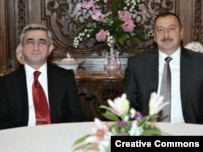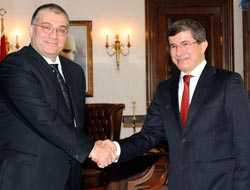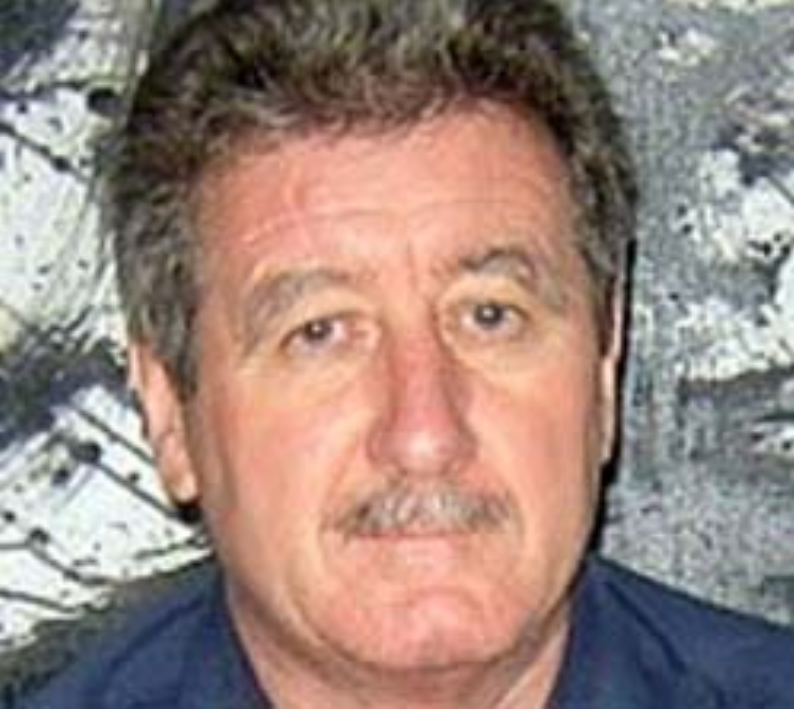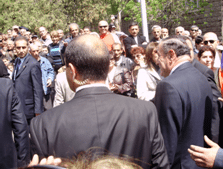IWPR’S CAUCASUS REPORTING SERVICE, No. 491, May 1, 2009
Plan to reopen frontier between Armenia and Turkey wins few friends in towns and villages on Turkish side.
By Sabuhi Mammadli in Igdir, Turkey
Talk of the possible reopening of the Turkish-Armenian border has left residents in nearby Turkish towns divided on whether such a development is what they need.
Many say that even if it means certain economic benefits for them, they are not ready to make friends with their Armenian neighbours.
Igdir is a small town in Turkey. For all its provinciality, it lies in an area of great strategic importance for Turkey, located at an intersection of the country’s borders with Azerbaijan, Armenia and Iran.
Most of the local people in Igdir are Azeris who moved here from territories in or adjacent to Nagorny Karabakh.
Turkey closed its border with Armenia in 1993 in sympathy with Azerbaijan, following a series of defeats that the latter had suffered in its war over Nagorny Karabakh.
There are still no diplomatic relations between the two countries due to the still unresolved Karabakh conflict and Armenia’s demands that Turkey recognise the following: the 1915 mass killings of Armenians in the Ottoman Empire as a genocide; and the territorial claims of some Armenian political parties to six provinces in Turkey’s north-east.
But the fact that the opening of the frontier is one of the 35 requirements Turkey needs to meet to be admitted to the European Union has put pressure on Ankara to find a solution.
Armenia and Turkey, with Switzerland as mediator, have been negotiating behind closed doors on the issue since 2002.
The unblocking of the border was the top item on the agenda in talks between Turkish prime minister Recep Tayyip Erdogan and United States president Barack Obama during the latter’s recent visit to Ankara.
The issue was also discussed during the Turkish president Abdullah Gul’s short visit to Armenia last September.
It also featured in the Turkish-Armenian talks being conducted in Switzerland, which resulted in the recent joint declaration of a so-called road map, leading towards hoped-for normalisation of relations.
Signs that Turkey and Armenia might be moving toward a rapprochement have displeased the Azerbaijan president, Ilham Aliev, however.
He showed his annoyance by refusing to attend a recent international conference in Ankara, thus sacrificing an opportunity to meet Obama, who attended the event among other high-ranking guests.
Despite Azerbaijan’s demarches, the Turkish-Armenian road map already envisions reopening two checkpoints on the frontier between the two countries.
One is located near the village of Alijan in Igdir; the other is in the Kars village of Akyaka.
Cahid Erol, head of the Igdir department of the National Movement Party, known in Turkey as the MHP, is worried by the momentum leading towards reopening of the border.
He fears the recent election of a Kurdish mayor in Igdir may have advanced an undesirable, process.
Erol recently lost the local elections to the candidate of the Kurdish Democratic Society Party, Mehmet Gunesh, whom Erol insists is a sympathiser with the Kurdish Workers’ Party, PKK, deemed a terrorist organisation in Turkey.
“Now, unfortunately, they’ve appointed a member of the PKK to lead the municipality,” Erol complained.
He worries that the new Kurdish municipal chief will act on his pledges to open the frontier with Armenia.
Soon after being elected, Gunesh told a local newspaper he would “open the gates of Alijan”, the village near one of the proposed checkpoints.
“This will boost the region’s economic development,” he told the same newspaper.
The idea of trading away Turkey’s alliance with Azerbaijan in exchange for “development” does not appeal to Erol.
“Our respected [party] chairman, Devlet Bahceli, says, ‘We won’t back off on Karabakh, even if Azerbaijan does,’” he retorted.
“We would be glad if Azerbaijan took a tough stance on the Turkey-Armenia border reopening issue, and if [President] Aliev upset the plans of Obama and Erdogan.
“Our party has made its position clear. The border will never be opened, or they will have to step over our dead bodies first.”
Opinions vary among ordinary residents of Igdir, though many seem as hostile to the reopening of the frontier as Erol.
Nuri, an employee in the Hotel Barbarossa, in the heart of Igdir, said such a development would stain Turkey’s reputation.
“I just can’t imagine Armenians traveling freely to Turkey,” he said. “How can it be possible?”
A local businessman, Ekrem Yesil, struck a similar line. He said the sociology department of the University of Arzrum had recently conducted a survey of 10,000 people, showing the overwhelming majority against reconciliation.
“Ninety-seven per cent of the respondents said they did not want the border reopened,” Yesil said.
“Most of the remaining three per cent were members of the pro-government Justice and Development Party.”
Murat Karademir, of the opposition Popular Republican Party, also adamantly opposes a rapprochement, describing Igdir as “the door to the Caucasus” – a door, he says, that needed to remain firmly shut in Armenia’s face.
“For Armenians, the town represents a path to Europe via Turkey; in a word, it’s a strategic territory,” he said.
“Opening this door to Armenians now would mean a catastrophe for Turkey, a threat to its security.
“Besides, the PKK is very active in this region; it’s not a secret for anyone that many PKK members are trained in Armenia and the occupied Karabakh.
“It is there that terrorists get their wounds treated. Already it’s very difficult to [prevent them going] crossing into Armenia. Unsealing the border would make it still easier for them to move.”
Mehmet Aydin, who comes from Alijan and now lives in Igdir, said Ankara had recently made a point of sending envoys to the village to argue for reopening the frontier.
“They have been saying, ‘You see how Igdir has evolved from a small village into a town after the border with Azerbaijan was opened. That’s what will happen to Alijan, [if the border with Armenia is unsealed]’.
“Some believe in this propaganda and want [it] to be reopened, but most don’t.”
But not everyone in Igdir wants the frontier with Armenia to remain shut forever.
Ahmet Sahin, a local activist of the Democratic Society Party, believes many businesses in Igdir now idling because of economic difficulties could get back on track if the border was opened.
“I’m an entrepreneur myself,“ he said. “The chemical goods produced at my factory have been collecting dust in storage facilities.
“What would be wrong if I took my produce to the Armenian market?”
“The border should be opened, because there are no jobs in Turkey,” agreed Mehmet Broi, a local teacher. “Trade has shrunk too. Armenia is a profitable territory for us.”
The governor of the area, Mehmet Karahisarli, also sounded a note of optimism about the possible reopening of the border. “[This] would stimulate business activity in both Igdir and the entire district,” he told IWPR.
But Turkish nationalists continue to reiterate that they will only tolerate seeing the frontier unsealed if Armenia meets a series of conditions.
These start with Nagorny Karabakh.
“First of all, Armenia has to un-occupy the territories of Karabakh,” Erol said.
“Secondly, they should get the genocide demand out of their heads. Thirdly, they should stop asking Turkey for compensation. Fourthly, they should give up their territorial claims regarding Turkey. Fifthly, they should admit to the [February 1992] massacre [of Azeris] in Khojali.
“Once the Armenians have met all these conditions, Erdogan and Gul can even become related to [Armenian president Serzh] Sargsian for all we care.
“Until they do, we have nothing to talk about.”
Sabuhi Mammadli is a freelance journalist.






 May Day is a pagan ritual which marks the end of the colder winter half of the year in the Northern hemisphere, and it has traditionally been an occasion for popular and often raucous celebrations – ‘regardless of the locally prevalent political establishment’. But not for Levon Ter-Petrossian, his Mayday was more akin to the Mayday associated with the emergency code word used internationally as a distress signal by ships and airplanes in radio communications; derived from the French venez m’aider, meaning ‘Come Help Me’; the Mayday used to signal a life-threatening emergency by groups such as police forces, pilots, fire-fighters, and transportation organizations – and LTP.
May Day is a pagan ritual which marks the end of the colder winter half of the year in the Northern hemisphere, and it has traditionally been an occasion for popular and often raucous celebrations – ‘regardless of the locally prevalent political establishment’. But not for Levon Ter-Petrossian, his Mayday was more akin to the Mayday associated with the emergency code word used internationally as a distress signal by ships and airplanes in radio communications; derived from the French venez m’aider, meaning ‘Come Help Me’; the Mayday used to signal a life-threatening emergency by groups such as police forces, pilots, fire-fighters, and transportation organizations – and LTP.